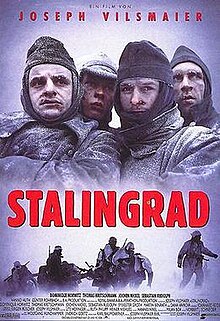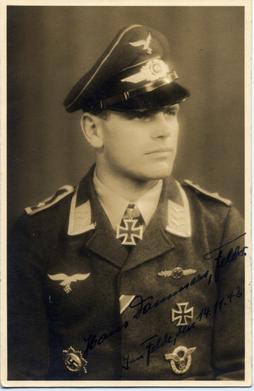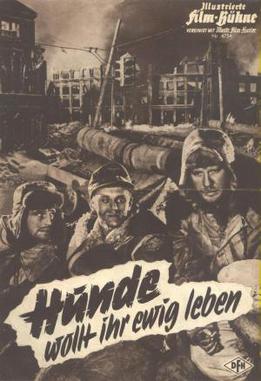Plot
In August 1942, German soldiers enjoy leave in Cervo, Liguria, Italy, after fighting at the First Battle of El Alamein, where Unteroffizier Manfred "Rollo" Rohleder and Obergefreiter Fritz Reiser are introduced to Leutnant Hans von Witzland, their new platoon commander. Their unit is promptly sent to the Eastern Front to fight in the Battle of Stalingrad.
Witzland's platoon joins a company commanded by Hauptmann Hermann Musk. Musk leads an assault on a factory, which results in heavy casualties. Later, Witzland requests a ceasefire with the Soviets so both sides can collect their wounded, which they agree to. Midway through, Müller (called "HGM" to distinguish him from other Müllers) breaks the ceasefire, and in the ensuing chaos a Russian boy ends up with the Germans. Witzland angrily assaults Müller. The Russian child introduces himself as Kolya.
Witzland's platoon is surrounded in a decrepit building. During a Soviet attack, Witzland, Reiser, Rollo, Emigholtz, and "G.G." Müller go down to secure the sewers, during which time Kolya runs away. Witzland gets separated from the others and captures a female soldier named Irina; she offers to lead him to safety, but instead pushes him into the water and escapes. His men rescue him. Emigholtz is severely wounded by an explosive trap, his right leg hastily amputated by the men. They take him to a crowded aid station, where they grab a doctor's assistant at gunpoint to treat Emigholtz, despite the medic's insistence that he is not a doctor. The assistant quickly injects Emigholtz, who dies very soon. The men are then arrested by Hauptmann Haller, who has previously clashed with Witzland regarding the treatment of Soviet prisoners. They are punished by being assigned to a penal battalion, disarming land mines.
Four weeks later, a brutal winter has set in and the Soviets have surrounded the German Sixth Army. Hauptmann Musk reassigns the penal battalion—which includes disgraced fellow officer Otto—to combat duty, after the men threaten to mutiny unless their crimes are pardoned. Witzland's platoon repels a Soviet tank column after a bloody battle. Hauptmann Haller later orders von Witzland and his men to execute a group of unarmed civilians accused of sabotage, including Kolya. Fritz and Witzland protest, but ultimately Fritz has to obey orders and shoots Kolya.
The killing of Kolya has a profound effect on the already demoralized soldiers; Witzland, G.G., and Reiser decide to desert. They head to Pitomnik Airfield in hopes of catching a plane back to Germany, stealing medical tags from some dead bodies along the way to feign being wounded. The last transport plane is about to leave as they arrive, but only officers are allowed aboard. Fritz asks why Hans, an officer, did not try to board, to no response.
They rejoin the others in the shelter, where they find Musk suffering from severe trench foot. While the men recover a German supply drop, Haller appears and holds them at gunpoint, but is quickly subdued; he accidentally shoots G.G. as he falls, killing him. Haller pleads for his life, first trying to use his authority, then telling them about the supplies he is hoarding in a nearby house, before being executed by Otto.
In the house's cellar, they find shelves stocked full of food and liquor, and Irina tied to a bed. Witzland cuts her free. She tries to provoke Witzland into killing her, but he refuses, instead giving her a pistol and telling her to do it herself. She cannot do it. As the rest of the men enjoy the luxuries, a deluded and dying Musk tries to rally them to rejoin the fighting. Otto becomes hysterical and shoots himself in the head. Rollo carries Musk outside, only to find the Sixth Army surrendering to the Soviets. Musk succumbs to the elements upon Rollo being instructed to surrender.
Irina offers to help Witzland and Reiser get away, but while trudging through a heavy snowstorm, they are shot at by Russian soldiers; Irina is killed instantly and Witzland is shot. Wounded and overwhelmed with grief, he eventually becomes too weak to walk, dying in Reiser's arms. Reiser cradles his body and freezes to death.
















